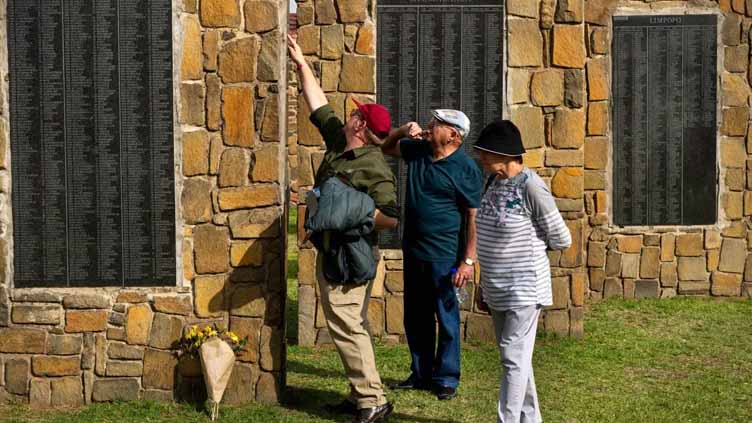Trump alleges 'genocide' in South Africa. At an agricultural fair, even Afrikaner farmers scoff

World
Some at the agricultural fair said fleeing the country isn’t one of them.
BOTHAVILLE, South Africa (AP) — Days before South Africa’s president meets with U.S. President Donald Trump at the White House this week, Afrikaner farmers at the center of an extraordinary new U.S. refugee policy roamed a memorial to farm attacks in their country’s agricultural heartland, some touching the names of the dead — both Black and white.
Here in Bothaville, where thousands of farmers gathered for a lively agricultural fair with everything from grains to guns on display, even some conservative white Afrikaner groups debunked the Trump administration’s “genocide” and land seizure claims that led it to cut all financial aid to South Africa.
The bustling scene was business as usual, with milkshakes and burgers and tow-headed children pulled in wagons.
The late President Nelson Mandela — South Africa’s first Black leader — stood in Bothaville over a quarter-century ago and acknowledged the increasing violent attacks on farmers in the first years following the decades-long racial system of apartheid. “But the complex problem of crime on our farms, as elsewhere, demand long-term solutions,” he said.
Some at the agricultural fair said fleeing the country isn’t one of them.
“I really hope that during the upcoming visit to Washington, (President Cyril Ramaphosa) is going to be able to put the facts before his counterpart and to demonstrate that there is no mass expropriation of land taking place in South Africa, and there is no genocide taking place,” John Steenhuisen, minister of agriculture, told The Associated Press. He will be part of the delegation for Wednesday’s meeting.
The minority white Afrikaner community is in the spotlight after the U.S. granted refugee status to at least 49 of them claiming to flee racial and violent persecution and widespread seizures of white-owned land — despite evidence that such claims are untrue.
While many at the agricultural fair raised serious concerns about the safety of farmers and farm workers, others were quick to point out that crime targeted both Black and white farmers and farm workers, as shown by South Africa’s crime statistics.
Thobani Ntonga, a Black farmer from Eastern Cape province, told the AP he had been attacked on his farm by criminals and almost kidnapped but a Black neighbor intervened.
“Crime affects both Black and white. ... It’s an issue of vulnerability,” he said. “Farmers are separated from your general public. We’re not near towns, we are in the rural areas. And I think it’s exactly that. So, perpetrators, they thrive on that, on the fact that farms are isolated.”
Other farmers echoed his thoughts and called for more resources and policing.
“Crime especially hits small-scale farmers worse because they don’t have resources for private security,” said Afrikaner farmer Willem de Chavonnes Vrugt. He and other farmers wondered why they would leave the land where they have been rooted for decades.
Ramaphosa, himself a cattle farmer, also visited the agricultural fair for the first time in about 20 years — to buy equipment but also do outreach as many in South Africa puzzle over the Trump administration’s focus on their country.
“We must not run away from our problems,” the president said during his visit. “When you run away, you’re a coward.”


